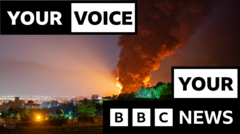What Are the Key Insights on the Israel-Iran Conflict?

Understanding the Ongoing Conflict Between Iran and Israel
The conflict between Iran and Israel has escalated dramatically, raising concerns about regional stability and global security. As tensions surge, the implications of the situation extend beyond the immediate actors involved, drawing in global powers and igniting debates about nuclear proliferation. This article aims to unpack the complexities of this conflict, including historical context, the current state of affairs, and potential future developments.
The Historical Context of Iran-Israel Relations
To comprehend the current situation, it is essential to explore the historical backdrop that has shaped Iran-Israel relations over the decades. Following the establishment of Israel in 1948, Iran was initially one of the few Muslim-majority countries to recognize the new state. However, this relationship soured after the 1979 Iranian Revolution, which saw the rise of an anti-Western, Islamic regime that viewed Israel as an illegitimate entity.
Since then, Iran has positioned itself as a key supporter of groups opposing Israel, including Hezbollah in Lebanon and Hamas in Gaza. This support has led to a cycle of violence, retaliation, and escalating hostilities, with both nations engaging in covert and overt military operations against each other.
The Role of Nuclear Proliferation in the Conflict
One of the most contentious issues in the Iran-Israel conflict is Iran's nuclear program. Israel perceives Iran's potential acquisition of nuclear weapons as an existential threat. Israeli officials argue that Iran's nuclear ambitions could lead to catastrophic outcomes, positing that if Iran were to develop nuclear capabilities, it would utilize them against Israel.
In recent months, reports have suggested that Iran has been accelerating its nuclear program, raising alarms within the Israeli government. Israel has accused Iran of breaching non-proliferation agreements and has asserted that diplomatic efforts to curtail Iran's nuclear ambitions have been futile.
The Current State of Military Engagement
The military engagement between Iran and Israel has intensified, particularly following the events of October 7, 2023. This date marked a significant escalation, with Israel launching a series of targeted operations against Iranian positions and allied forces in the region. The Israeli Defense Forces (IDF) have conducted strikes on various locations, including munitions facilities and command centers, which are believed to be supporting hostile activities against Israel.
Evacuations and Civilian Impact
As military actions unfold, the civilian population in Iran, particularly in Tehran, is facing dire consequences. The IDF has issued evacuation notices for certain districts, but the reality is that relocating millions of people from a densely populated city is nearly impossible. Traffic congestion has surged, with many attempting to flee to perceived safer areas. The Iranian government has responded by opening metro stations for shelter, highlighting the gravity of the situation.
This chaos underscores the human cost of the conflict and raises ethical questions regarding the conduct of war, particularly in urban settings where civilians are at risk.
The Role of Global Powers
The United States, historically a staunch ally of Israel, plays a critical role in this conflict. President Donald Trump's ambiguous stance on whether the U.S. might intervene has raised concerns about the potential for a broader conflict. The presence of approximately 40,000 to 50,000 U.S. troops stationed across the Middle East adds another layer of complexity to the situation.
Should the U.S. decide to intervene, the ramifications could be monumental, potentially triggering wider regional instability and drawing in other international actors.
Internal Dynamics in Iran
The internal political landscape in Iran is also a critical factor in understanding the conflict. Supreme Leader Ali Khamenei wields significant power, overseeing not just military decisions but also the broader political narrative. However, he does not possess unanimous support from the Iranian populace, which has seen substantial protests against the regime in recent years.
The fragmented nature of Iranian society complicates the situation. While there are figures like Reza Pahlavi, the exiled son of the former Shah, advocating for change, there is no cohesive opposition ready to step in and replace the current government. This lack of unity within Iran can both exacerbate the conflict and hinder efforts toward peaceful resolution.
Analyzing the Future of the Iran-Israel Conflict
Predicting the future of the Iran-Israel conflict is fraught with uncertainty. Analysts have different views on the likelihood of a regional war or a potential resolution. Some argue that Israel's recent military successes have weakened Iran's traditional allies, reducing the threat level significantly. Others emphasize the unpredictability of Iran's responses, especially if it feels cornered.
The role of international diplomacy remains crucial. While negotiations have stalled, there is a pressing need for dialogue to prevent further escalation. U.S. involvement could either stabilize the situation or complicate it further, depending on the decisions made by global leaders.
The Risk of Nuclear Escalation
One of the most pressing concerns is the potential for nuclear escalation. As Israel maintains that Iran is on the cusp of developing nuclear weapons, the stakes are incredibly high. The International Atomic Energy Agency (IAEA) has reported that Iran has amassed a significant stockpile of enriched uranium, raising alarms about its intentions.
However, it is essential to distinguish between speculation and verified intelligence. While Israel claims Iran is nearing the capability to build a bomb, U.S. intelligence has consistently stated that, despite its enriched uranium stockpile, Iran is not actively working towards a nuclear weapon. This discrepancy highlights the complexities of intelligence and the narratives that countries choose to promote.
Conclusion: The Path Forward
The ongoing conflict between Iran and Israel presents a myriad of challenges that could have far-reaching implications for the Middle East and beyond. As military engagements continue and the specter of nuclear proliferation looms, the international community must remain vigilant. Diplomatic efforts, though challenging, are vital to de-escalating tensions and preventing catastrophic outcomes.
Ultimately, the resolution of this conflict will require a nuanced understanding of the historical, political, and social dynamics at play. Only through careful negotiation and a commitment to dialogue can the cycle of violence be broken.
FAQs
What factors contribute to the ongoing conflict between Iran and Israel?
The conflict is rooted in historical animosities, differing political ideologies, and the contentious issue of Iran's nuclear program, which Israel views as an existential threat.
How does the presence of U.S. troops in the Middle East affect the conflict?
The presence of U.S. troops adds a layer of complexity to the conflict. Their involvement could either deter aggression or escalate tensions, depending on the U.S. government's actions and responses.
What is the significance of Iran's nuclear program in the conflict?
Iran's nuclear program is perceived by Israel as a direct threat, with concerns that a nuclear-armed Iran could lead to catastrophic consequences for Israel and the wider region.
What are the potential outcomes of the Iran-Israel conflict?
Outcomes range from continued military engagement and potential escalation to renewed diplomatic efforts aimed at conflict resolution, though the path forward is fraught with challenges.
As the situation develops, how do you envision the future of Iran-Israel relations? What steps do you think should be taken to de-escalate tensions? #IranIsraelConflict #NuclearProliferation #MiddleEastPeace
Published: 2025-06-18 20:59:13 | Category: technology



